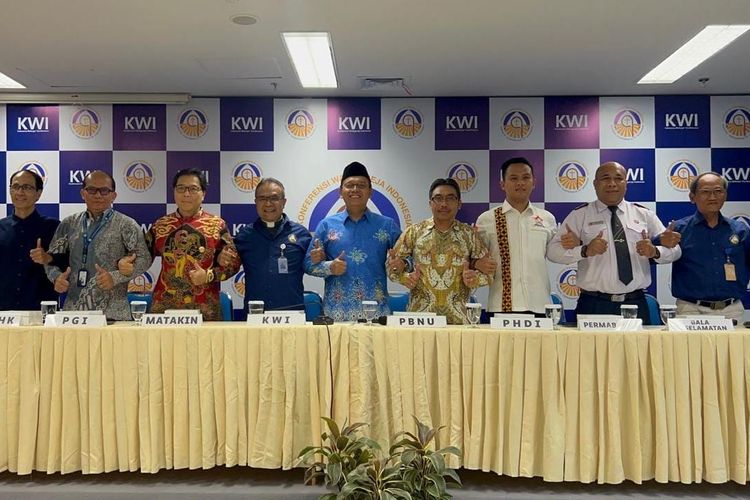Jakarta: Religious leaders unite against intolerance towards minorities
During a meeting hosted by the Indonesian Bishops' Conference, representatives of the country's main faiths expressed strong concern about the violence and restrictions suffered by religious minorities and called for a review of the 2006 decree on places of worship and decisive action by the government.
Jakarta (AsiaNews) – Leaders of Indonesia's main denominations have launched a joint appeal against growing religious intolerance towards religious minorities. During the meeting, held on July 5 at the headquarters of the Indonesian Bishops' Conference (KWI), deep concern emerged over acts of intimidation and restrictions on the worship activities of different faiths.
“This is a crucial moment for the state to truly show its presence in protecting religious freedom,” said Fr. Aloysius Budi Purnomo, executive secretary of the KWI's Interreligious Commission.
“Every citizen, regardless of religious affiliation, must be able to practice their faith freely, without intimidation or interference from intolerant groups.” In supporting the request, a representative of the Bala Keselamatan (Salvation Army) Church referred to the national ideology of Pancasila, based on respect for diversity, while the Indonesian Hindu Association stressed the urgency of government intervention, recalling that religious institutions alone do not have the legal authority to deal with violent acts.
During the conference, Professor Rumahi Ahmad of Nahdlatul Ulama, the country's largest and most moderate Muslim organization, spoke of the meeting as an “urgent appeal to protect the fundamental principle of the nation: unity in diversity.”
He warned that “the growing sense of fear among religious minorities could fuel further intolerance,” adding that this is only “the tip of the iceberg.” Ahmad reiterated that “social harmony is the foundation of our national identity and must be defended,” calling on the government to “enact new regulations that guarantee religious freedom as a social right.”
Although intolerance has generally declined in recent years, Ahmad continued, there has been a resurgence of worrying incidents, such as the recent ones in Sukabumi and Padang, the capital of West Sumatra province, where a group of Christians praying were targeted by a group of extremists at the end of July.
He also recalled that “there are past incidents that remain unresolved to this day” and that it is “essential to continue to remind society that such behavior should never be accepted as normal.” Also in Sukabumi, in the district of Cidahu, West Java province, at the end of June, hundreds of people stormed a house where a group of young Christians were on retreat.
Religious leaders have called for a review of the controversial 2006 decree, which is considered discriminatory because it requires a series of requirements for the construction of places of worship that often hinder the activities of minorities.
The regulation requires the approval of the regent or mayor, a recommendation from the Forum for Interreligious Harmony, and the written support of at least 90 members of the religious community and 60 local residents.
In a joint statement issued at the end of the conference, the signatories reiterated that religious freedom and the right to worship are enshrined in the Constitution and called on the state to act firmly to prevent such incidents from recurring.
They urged law enforcement agencies to thoroughly investigate and prosecute those responsible for acts of violence and destruction, and called on the government and the Forum for Interreligious Harmony to ensure that places of worship remain safe and peaceful spaces. The statement concludes with an appeal to religious leaders to guide their communities to resist provocation.
Chandra Setiawan of the Supreme Council for Confucian Religion lamented the lack of sensitivity towards religious pluralism, criticizing the state's weakness in countering radicalism. Reverend Saragih of the Communion of Churches in Indonesia (PGI) also said that "Indonesia is our common home, there are no mere passengers here. Everyone is equal. The state cannot turn a blind eye to intolerance."
The PGI then expressed appreciation for the gesture of Vice President Gibran Rakabuming Raka, who visited Padang, but also reiterated the urgency of “legal reforms” and “revisions of regulations on permits for places of worship.” A representative of the Indonesian Orthodox Church concluded by calling on the government to “act more boldly.”







.png)










